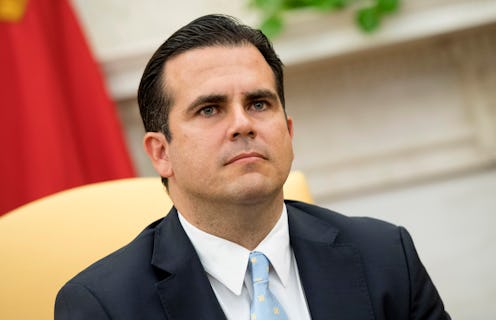News
Why Republicans' Tax Plan Is A Huge Cop-Out On Their Promise To Help Puerto Rico

For the past several weeks, the Republican Party has been working to pass what would be its biggest legislative achievement of the Trump era, a massive tax cut aimed primarily at corporations and upper-class. But its impacts would go far beyond simply adjusting the tax rates ― in fact, as the governor of Puerto Rico just warned, it could devastate the island even further in the aftermath of Hurricane Maria.
Thanks to a slew of tacked-on provisions, the GOP's tax proposal ― widely unpopular, with a reported 64 percent of Americans opposed to its passage ― would have widespread effects. In addition to slashing the corporate tax rate from 35 percent to just 21 percent, the lowest in American history, it would also repeal the Affordable Care Act's individual mandate, and repeal the inheritance tax, which only affects individuals leaving behind estates valued at more than $5.49 million.
In short, it's loaded up with some familiar items on the GOP's legislative wish list. But the provisions which impact Puerto Rico are being decried by Puerto Rico governor Ricardo Rossello, who told NBC News the bill is "devastating and unconscionable" in how it treats his homeland.
The upshot, according to The New York Times, is that among other things, it'll impose a 12.5 percent tax on income from the "intangible assets" of U.S. mainland companies stationed in Puerto Rico. What this means, in broad strokes, is that the GOP tax bill would effectively treat the island as though it were a foreign country, separate from the United States.
"They are treating Puerto Rico as a foreign jurisdiction so they are levying a full tax," Rossello told NBC News, who fears the taxes will have a negative impact on Puerto Rico's economy and employment. He also reportedly criticized Republican congressional leaders like Paul Ryan, who visited Puerto Rico and pledged his ongoing support, for going back on their obligations.
They certainly turned a blind eye, turned their back on Puerto Rico. It shows a lot of hypocrisy. They stated what the path forward was in 2016 and now they do the exact opposite.
In reality, although polling suggests nearly half of all Americans don't realize it, Puerto Rico is a U.S. territory, and native-born Puerto Ricans are themselves American citizens. Hurricane Maria was the worst natural disaster in Puerto Rico's history, reaping billions of dollars of damages and potentially leaving more than 1,000 people dead, according to an analysis by The New York Times.
The hurricane catastrophically exacerbated what was already a dire economic situation for the island, thanks to its massive debts. Prior to the hurricane touching down, the island was already more than $70 billion in debt, and Rossello has estimated the recovery costs associated with the hurricane at $94 billion.
Rossello also sharply criticized Florida senator Marco Rubio, according to NBC News, for changing course on his momentary opposition to the bill. Rubio had voiced opposition in an effort to extract a compromise from Republican leadership on child tax credits. Although he didn't get nearly as much as he'd aimed for, it was seemingly enough to sway him back to supporting the bill.
Rossello called it "disappointing" that Rubio was not more staunch in his opposition, given the potentially the damaging impacts of the bill for Puerto Ricans.
It is a devastating blow to the people of Puerto Rico. Senator Rubio seemed to understand what it meant that it had a severe impact on Puerto Rico. So it is disappointing.
As it stands now, the tax bill appears primed for passage. After clearing the Senate, it had to be reconciled with the version passed by the House. That process has since been finished, and the completed bill is expected to be voted on sometime next week. If so, it'll head to President Donald Trump's desk for signature, and after months of calling for its passage, he is certain to sign it into law.